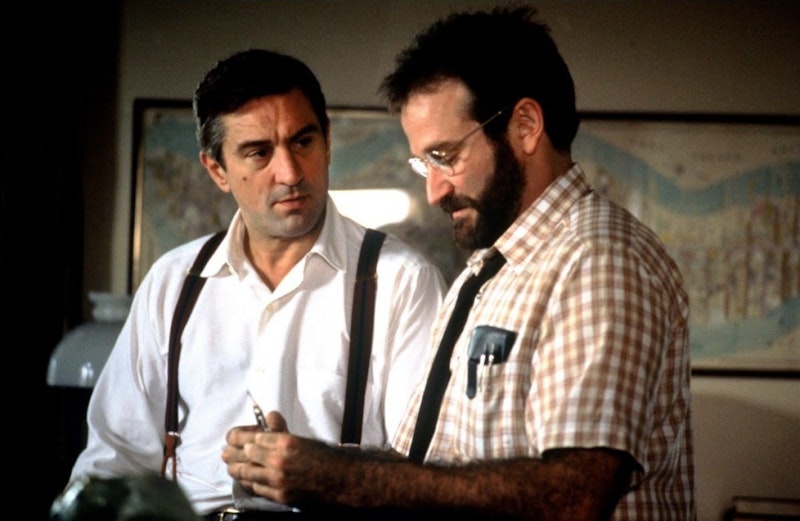There are a lot of parallels between the second Hollywood film directed by a woman to get a Best Picture nomination and the first. Like Randa Haines’ 1987 Children of a Lesser God, Penny Marshall’s 1990 Awakenings is about an empathetic doctor who bucked the establishment to embrace new treatments. Like Children, the film’s a broad melodrama about confronting and (sporadically) overcoming disability. And like Children, the direction is deliberately low key, the budget modest, and the moral one of acceptance and uplift.
Once can be an accident; twice looks like carelessness. It’s a small sample set, but when women directors at the academy are so early, and so insistently, celebrated for a very particular narrative, it’s hard not to feel like their successes are to some degree predicated on perceptions about which stories women can tell and how they should tell them.
Children of a Lesser God was admirable and innovative in that it was a story about a disabled person that featured a person (Marlee Matlin) who was disabled. Awakenings is in that sense a step backwards. Loosely based on the memoirs of celebrated writer and neuroscientist Oliver Sacks, the film stars Robin Williams as Dr. Malcolm Sayer, a Bronx doctor in a clinical hospital in 1969. Sayer discovers that many of the hospital’s catatonic patients are survivors of the encephalitis epidemic of 1919 to 1930. They’ve been unresponsive for decades, but Sayer tries the Parkinson’s drug L-DOPA on patient Leonard Lowe (Robert De Niro)—who miraculously awakens. The other patients respond similarly over the course of one summer. Until they don’t.
Williams and DeNiro were praised for their performances at the time, but the movie is mostly forgotten, and it’s not difficult to see why. Sayer’s presented as a shy, lonely, empathetic man—a kind of virginal saint, who needs to be taught to seize the day by the childlike-but-wise Leonard. DeNiro’s charismatic smile when he awakes is devastating, but the film does little to explore what it’s like for him to fall asleep as a child and awaken 30 years later as an adult. He likes girls now, we learn. He wades in the ocean. He tells Sayer to be more adventurous, the doctor’s own Manic Pixie Dream Disabled Person.
After awake for some time, Leonard does demand greater autonomy, pointing out that he’s an adult and should be allowed to go outside and take a walk if he wants. But immediately after his request we see his symptoms return and he descends into paranoia. Asking to be treated by a person is presented less as natural resentment at being infantilized, and more as the first step on the descent into Bad Leonard. The doctors know best; the disabled need to embrace humility and obedience. As his condition worsens, DeNiro throws himself into the method-acting tour de force of reproducing Parkinsonian tics and jerks and spasms; like Dustin Hoffman in Rain Man from two years earlier, his performance walks an uncomfortable line between verisimilitude and unintentional parody.
During a particularly violent seizure Leonard demands that Sayer get a camera and record him: “Learn from me! Learn from me!” he stutters. It’s an explicit statement of permission to movie viewers, encouraging them to drink in the spectacle of disability both for science and for moral enlightenment. As such it’s a kind of quintessence of disability inspiration porn. That’s underlined by Sayer’s final speech, in which he declares:
What we do know is that, as the chemical window closed, another awakening took place; that the human spirit is more powerful than any drug—and THAT is what needs to be nourished: with work, play, friendship, family. THESE are the things that matter. This is what we'd forgotten—the simplest things.
Leonard’s illness, his cure, and his relapse are important not for what they mean to Leonard, but because of what they can teach everyone, onscreen and watching, about the beauty and wonder of humanity. Leonard suffers so we can appreciate the good things in life, and Sayer can finally find the courage to go on a coffee date with the cute nurse.
Again, Children of a Lesser God has a more nuanced, insightful, and respectful approach to disability and the disabled. It’s telling, though, that the first two female directors with Best Picture nominations were honored for films that center on intimate melodramatic narratives of disability and healing—in stark contrast to the bold, male, cross-cultural adventure and exploration narrative of, for example, Dances With Wolves, which won the Best Picture Oscar the same year Awakenings was nominated.
Marshall’s next film A League of Their Own (1992)—with its feminist message and gender-bending of the traditionally male baseball film—wasn’t nominated for an Oscar, though it’s a much better movie than its predecessor. In the 1980s and early-90s, Hollywood was comfortable with women directors only when they presented themselves not as auteurs or pioneers, but as traditional mothers or nurses, performing and cultivating empathy for the supposedly less fortunate. If Awakenings is a cure for Hollywood’s sexism, then it is, unfortunately, a cure which was painfully limited.

